Review: Disney’s Wilderness Lodge, Continued 2
By Dave Shute
For the first page of this review, click here.
MORE ON DISNEY’S WILDERNESS LODGE
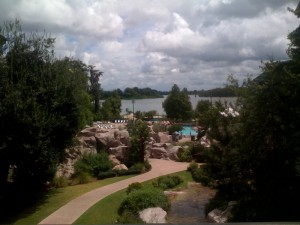
In their recommended order for first time family visitors, they are
(Many of these also offer Disney Vacation Club studios and villas, all for rent to the general public–see this for more on the Disney Vacation Club resorts.)
ROOMS AT DISNEY’S WILDERNESS LODGE
All Disney deluxe resorts have standard rooms; concierge rooms, which Disney calls “club” rooms; and suites. (See this for more on suites at Walt Disney World.) The Wilderness Lodge has, in addition, club-level deluxe rooms.
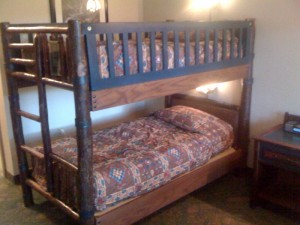
(See photo for the bunks, the mattresses of which I measured as 5’9″ long and 39″ wide.)
A few standard rooms with a king, sleeping two, are also available.
Standard rooms are sold with “standard,” “courtyard”, and “woods” views.
Courtyard views look into the center of the open space, woods views into the woods, and standard views–the least expensive–onto something else…e.g. a parking lot.
(To see the standard room floorplan, click here for the first page of this review.)
When you enter a standard room, you’ll first find the mini fridge, topped by a couple of drawers. Further down the long entry hall on the same side is a nice-sized closet, and on the other side the door to the bath.
The first part of the bath is a lovely but badly lit double sink, with minor storage below. Through a door is the toilet and tub. This space is spartan, and the tub, though adequate, is less than five feet long.
The hall opens into the small bedroom space. Along one wall is the connecting door, TV credenza with three large drawers, and a table and two chairs. The beds are along the other wall, with bedside tables that add small amounts of additional storage. This entire space is as poorly lit as the bathroom.
Though these rooms are tied with the Animal Kingdom Lodge’s rooms as the smallest standard deluxe rooms on property, the space rarely feels cramped; it just has no more space than it absolutely needs.
The final space in a standard room is a balcony or patio, with two chairs and a table.
- Club rooms–which the rest of the world calls concierge rooms–are not worth the extra cost for most first time family visitors. However, they may be well worth it for families intending to spend more time at the Wilderness Lodge than implied by this site’s itineraries. TikimanPages.com has a great discussion of the value of concierge rooms here. Though focused on the Polynesian, it applies to any deluxe resort.
Deluxe rooms are suite-like club rooms. They sleep 6–four in two queens in the bedroom, and two in a fold-out couch in the sitting room. (See floorplan at right.) For a review of these rooms, click here.
- Suites sleeping 2 to 4 people are available for families seeking a particularly comfortable visit–see this for more on suites at Walt Disney World. The Yosemite Vice Presidential suite, with 885 square feet, sleeps 4–two in the bedroom in a king, and 2 in a queen sleeper sofa in the parlor. The Yellowstone Presidential Suite has the same sleeping arrangements in 1000 square feet.
(To each of the capacity figures above, you can add one more kid under 3 at time of check in who sleeps in a crib.)
THE THEMING OF DISNEY’S WILDERNESS LODGE
Disney’s Wilderness Lodge opened in 1994, and its last renovation was completed in 2007. It is officially described on Walt Disney World’s website as
“…inspired by the Great American Northwest National Park lodges from the turn of the 20th century…an architecturally grand Disney Deluxe Resort hotel honoring American craftsmanship and artistry, and celebrating the majesty of the unspoiled wilderness.
“The theme of being in harmony with nature winds through the lodge—inside and out. Authentic decor and genuine artifacts pay homage to ancient Native American cultures and the pioneering spirit of early American explorers.
“From its stunning 7-story lobby, built from 85 loads of Lodgepole Pine, to its 82-foot-tall lobby fireplace, the Resort is as beautiful as it is impressive. Its 727 Guest rooms offer themes of wildlife, nature and Native American designs, and include Honeymoon Suites featuring marble whirlpool tubs.
“On the Resort grounds, look for the bubbling spring that flows into a creek, tumbles over a sparkling waterfall and empties into the swimming pool. Catch the eruption of Fire Rock Geyser, fashioned after Yellowstone National Park’s Old Faithful, with its plume of water jetting 120 feet into the air.”
The description of the Wilderness Lodge as being “inspired by the great American Northwest,” though presented by Disney itself, and widely repeated in guidebooks and the internet, is a bit of a crock.
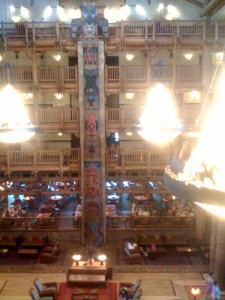
It also celebrates other remarkable western areas, such as the Grand Canyon in the southwest.
That said, the Wilderness Lodge is in fact largely inspired by, and is in homage to, the Mountain West–the basic architecture, the look of the lobby, and the “Fire Rock Geyser” are all based on Yellowstone, which is not part of America’s Northwest by a long shot.
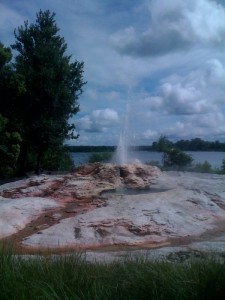
The second most significant influence on Wilderness Lodge theming after Yellowstone is the art and artifacts of Native Americans.
Tribes represented in the Lodge cross the country from the southwest (the Navajo and Apache) to the northwest to the great plains to the southeast (Cherokee.)
The third most significant influence is the Grand Canyon in general, and in particular Mary Colter’s masterwork Bright Angel Lodge there, from which the lobby fireplace was adapted and expanded (to 82 feet!!). (I have always thought that Colter’s work at the Grand Canyon made her the first Imagineer…years before Walt Disney ever thought of the term!)
Additional theme influences include the great vernacular styles associated with westward expansion and its later re-interpretations–ranging from Frank Lloyd Wright to Thomas Molesworth to the Mission style.
The simplest, but still largely accurate, description of the Wilderness Lodge’s theme would be that it honors the mountain west; a longer but more accurate description would be that it is based on the great National Park Lodges of the early 1900s, and honors the Native Americans who first lived in this land, as well as later explorers and their descendants–hunters, trappers, guides, woodsmen, cowboys, etc.
The Wilderness Lodge was designed by Peter Dominick, who also designed the next-most stunning Disney resort, the Animal Kingdom Lodge.
In an obituary of Dominick (he died in 2009), it was noted that Dominick “understood the building traditions of the Rocky Mountain West…his specialty was wonderful buildings that celebrated the landscape he loved.”
PAGES: Previous | 1 | 2 | 3 | Next

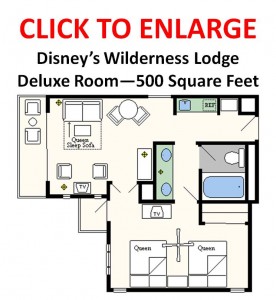


0 comments
Comment by typing in the form below.
Leave a Comment | Ask a Question | Note a Problem